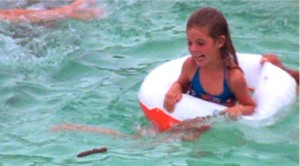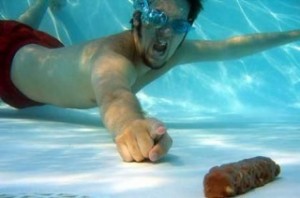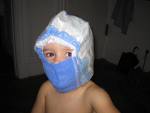In March 2012, dozens of people were apparently sickened with norovirus after visiting an eastern Iowa swim facility.
The Quad-City Times has been trying to name the facility, but an Iowa law allows public health officials to keep secret the name of a business involved in a disease investigation; this, say some of those sickened, puts business interests before public safety.
Johnson County and state health officials won’t release the name of the facility despite dozens being sickened, citing state law that shields businesses that have cleaned up their act after an outbreak. They also .jpeg) believe there is no ongoing public health risk.
believe there is no ongoing public health risk.
“I just wish the name would be out there, so others could know about this happening at a family attraction,” said Courtney Evans of Blue Grass, Iowa. Evans’ two young boys and her husband fell ill from norovirus after a visit to the swim facility.
The Quad-City Times and The Gazette of Cedar Rapids jointly filed a complaint with the Iowa Office of Citizens’ Aide about the health department’s refusal to release the name of the swim facility or provide key details about the investigation, such as dates of when people got sick. The Citizens’ Aide ruled public health officials followed the law.
“The problem is that I have to obey the law,” said State Epidemiologist Patricia Quinlisk. “If people feel that is incorrect, they have to talk with their legislators (about changing the law).”
Some Iowa legislators say the current law might go too far.
“We have a duty to inform the public that this has occurred and that it’s been remedied,” said Rep. Rick Olson, D-Des Moines. “I want to keep my kids healthy.”
Rep. Vicki Lensing, D-Iowa City, said the public needs accurate information from the health department, not speculation. “It would seem like after an investigation is concluded that information could be released,” she said.
Records obtained by the Quad-City Times and the Gazette through an Open Records request with the Johnson County Public Health Department indicate more than 30 people contracted norovirus after visiting the swim facility in March. Johnson County, which handled the facility investigation, inspects pools in Johnson, Iowa, Louisa and Muscatine counties.
“Early this morning, all family members began vomiting and have experienced diarrhea,” states a Johnson County record-of-contact form. The complainant “contacted the family members they traveled with, and all are experiencing the same symptoms.”
“…the complainant believes that illnesses derived from exposure to pool water. The two individuals that did not enter the pool water have not become sick,” the report shows.
According to the records, which include handwritten notes, reports and emails, chemical tests leading up to the outbreak showed the pools had little or no chlorine, which kills pathogens that can cause disease. Pool .jpg) management told officials a chlorine feeder was plugged.
management told officials a chlorine feeder was plugged.
Iowa Code Section 139A.3 states “information contained in the report may be reported in public health records in a manner which prevents the identification of any person or business named in the report.” This means public health officials can tell the public about the outbreak only in a generic way that doesn’t identify the business.
Before Quinlisk decides to keep investigation details secret she asks herself one question: Would she take her own child to the facility?
In this case, the answer was yes, she said.
Not every state gives businesses the same protection as individuals when it comes to disease reports. Minnesota, for example, only keeps the health records of individuals private, not businesses.
“If we have an outbreak at Joe’s Diner, that’s public,” said Richard Danila, deputy Minnesota epidemiologist.
The Illinois Department of Public Health has a policy to keep confidential the name of a business involved in a disease investigation, but the information can be obtained through open records requests after the investigation is concluded, said Department spokeswoman Melaney Arnold.
An accompanying editorial says several Quad-City area families sickened by the virus contacted us and were referred by Scott County health officials to the Johnson County Health Department in late March. We followed up, pursuing public records to confirm the account.
We were not seeking the names of the victims. The victims came to us. They spoke on the record.
So, yes, we know what business was investigated.
But we need public officials verifying the investigation to be able to report this responsibly and without fear of liability from a possible lawsuit since the origin of the norovirus has not been proven, the business complied with orders to take corrective action, and there was no perceived ongoing public health risk.
If I wanted to take my child to the facility, I would want to know their track-record and whether they could adequately manage things like chlorine levels, or whether I should bring my own pH strips.
Just like I want to know the track record of a restaurant before I spend my money there.
 swimming at Burrillville’s Spring Lake Beach in Rhode Island, and the municipality of Östersund in northern Sweden has been charged for environmental crimes following an outbreak of cryptosporidium which sickened some 30,000 people in the winter of 2010.
swimming at Burrillville’s Spring Lake Beach in Rhode Island, and the municipality of Östersund in northern Sweden has been charged for environmental crimes following an outbreak of cryptosporidium which sickened some 30,000 people in the winter of 2010. sewage into an underground reservoir that feeds sprinklers for the splash pad, rain arc, and mister.
sewage into an underground reservoir that feeds sprinklers for the splash pad, rain arc, and mister.



 been ill after playing at the complex.
been ill after playing at the complex. days later.
days later. parasite. Still, those efforts can be rendered ineffective when people carrying the disease use recreational waters.
parasite. Still, those efforts can be rendered ineffective when people carrying the disease use recreational waters..jpeg) believe there is no ongoing public health risk.
believe there is no ongoing public health risk..jpg) management told officials a chlorine feeder was plugged.
management told officials a chlorine feeder was plugged..jpg) ill with diarrhea (i.e., swimming while ill with diarrhea can lead to gross contamination of recreational water). Before the 2008 summer swimming season, Utah public health agencies launched a multimedia healthy swimming campaign. To assess knowledge of healthy swimming, a survey of Utah residents was conducted during July–September 2008. The results of that survey found that 96.1% of respondents correctly indicated that "it is not OK to swim if you have diarrhea."
ill with diarrhea (i.e., swimming while ill with diarrhea can lead to gross contamination of recreational water). Before the 2008 summer swimming season, Utah public health agencies launched a multimedia healthy swimming campaign. To assess knowledge of healthy swimming, a survey of Utah residents was conducted during July–September 2008. The results of that survey found that 96.1% of respondents correctly indicated that "it is not OK to swim if you have diarrhea." .jpg) television advertisements, public service radio announcements, and posters at pools (e.g., "A Swimming Pool is Like a Community Bathtub"). In addition, targeted messages were disseminated to schools, competitive water sports teams, and licensed childcare facilities. SLVHD also conducted a press conference during Recreational Water Illness and Injury Prevention Week, which is held each year the week before the Memorial Day holiday.
television advertisements, public service radio announcements, and posters at pools (e.g., "A Swimming Pool is Like a Community Bathtub"). In addition, targeted messages were disseminated to schools, competitive water sports teams, and licensed childcare facilities. SLVHD also conducted a press conference during Recreational Water Illness and Injury Prevention Week, which is held each year the week before the Memorial Day holiday.